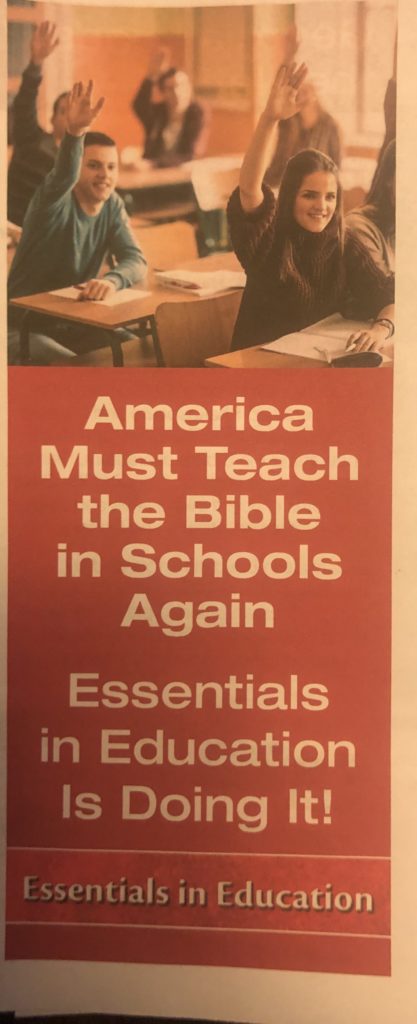
At the March Regular Session Chattooga County Board of Education meeting the Board considered Board Chairman, John Agnew’s recommendation to approve the addition of an elective class, based on Senate Bill 83, History and Literature of the Old and New Testament Eras.


-Motion to approve was made by Mr. Agnew with a second by Dr. Houston and the vote was unanimous.

John Agnew
19 LC 33 7812S(SCS)
S. B. 83
– 1 –
Senate Bill 83
By: Senators Mullis of the 53rd, Miller of the 49th, Dugan of the 30th, Albers of the 56th,
Gooch of the 51st and others
AS PASSED SENATE
A BILL TO BE ENTITLED
AN ACT
1 To amend Part 2 of Article 6 of Chapter 2 of Title 20 of the Official Code of Georgia
2 Annotated, relating to competencies and core curriculum relative to quality basic education,
3 so as to revise provisions relating to elective courses in History and Literature of the Old and
4 New Testament Eras; to provide for related matters; to repeal conflicting laws; and for other
5 purposes.
6 BE IT ENACTED BY THE GENERAL ASSEMBLY OF GEORGIA:
7 SECTION 1.
8 Part 2 of Article 6 of Chapter 2 of Title 20 of the Official Code of Georgia Annotated,
9 relating to competencies and core curriculum relative to quality basic education, is amended
10 by revising Code Section 20-2-148, relating to elective courses in History and Literature of
11 the Old and New Testament Eras, as follows:
12 “20-2-148.
13 (a)(1) All public schools with grade nine or above may make available to eligible students
14 in grades nine through 12 an elective course in:
15 (A) In the History and Literature of the Old Testament Era and an elective course in;
16 (B) In the History and Literature of the New Testament Era;
17 (C) On the Hebrew Scriptures, Old Testament of the Bible;
18 (D) On the New Testament of the Bible; and
19 (E) On the Hebrew Scriptures and the New Testament of the Bible.
20 (2) The purpose of such courses shall be to accommodate the rights and desires of those
21 teachers and students who wish to teach and study the Old and New Testaments and to
22 familiarize students with the contents of the Old and New Testaments, the history
23 recorded by the Old and New Testaments, the literary style and structure of the Old and
24 New Testaments, the customs and cultures of the peoples and societies recorded in the
25 Old and New Testaments, and the influence of the Old and New Testaments upon law,
26 history, government, literature, art, music, customs, morals, values, and culture:
19 LC 33 7812S(SCS)
S. B. 83
– 2 –
27 (A) Teach students knowledge of biblical content, characters, poetry, and narratives
28 that are prerequisites to understanding contemporary society and culture, including
29 literature, art, music, mores, oratory, and public policy; and
30 (B) Familiarize students with, as applicable:
31 (i) The contents of the Hebrew Scriptures or New Testament;
32 (ii) The history of the Hebrew Scriptures or New Testament;
33 (iii) The literary style and structure of the Hebrew Scriptures or New Testament; and
34 (iv) The influence of the Hebrew Scriptures or New Testament on law, history,
35 government, literature, art, music, customs, morals, values, and culture.
36 (3) A student shall not be required to use a specific translation as the sole text of the
37 Hebrew Scriptures or New Testament.
38 (b)(1) No later than February 1, 2007, the The State Board of Education shall adopt a
39 curriculum content standards for each course, including objectives, and reading materials,
40 and lesson plans, which has been are prepared in accordance with the requirements of this
41 subsection.
42 (2) The book or collection of books commonly known as the Old Testament shall be the
43 basic text for the course in the History and Literature of the Old Testament Era, and the
44 book or collection of books commonly known as the New Testament shall be the basic
45 text for the course in the History and Literature of the New Testament Era. In addition,
46 students may be assigned a range of reading materials for the courses, including
47 selections from secular historical and cultural works and selections from other religious
48 and cultural traditions. The content standards for the courses shall familiarize students
49 with the customs and cultures of the times and places referred to in the Old and New
50 Testaments. The content standards for the courses shall familiarize the students with the
51 methods and tools of writing at the times the Old and New Testament books were written,
52 the means by which they were preserved, the languages in which they were written and
53 into which they were translated, and the historical and cultural events which led to the
54 translation of the Old and New Testaments into the English language. The local board
55 of education may recommend which version of the Old or New Testament may be used
56 in the course; provided, however, that the teacher of the course shall not be required to
57 adopt that recommendation but may use the recommended version or another version.
58 No student shall be required to use one version as the sole text of the Old or New
59 Testament. If a student desires to use as the basic text a different version of the Old or
60 New Testament from that chosen by the local board of education or teacher, he or she
61 shall be permitted to do so.
62 (3) The courses provided for in this Code section shall:
19 LC 33 7812S(SCS)
S. B. 83
– 3 –
63 (A) Be taught in an objective and nondevotional manner with no attempt made to
64 indoctrinate students as to either the truth or falsity of the biblical materials or texts
65 from other religious or cultural traditions;
66 (B) Not include teaching of religious doctrine or sectarian interpretation of the Bible
67 or of texts from other religious or cultural traditions; and
68 (C) Not disparage or encourage a commitment to a set of religious beliefs.
69 (c) The provisions of this chapter relating to personnel employed by local units of
70 administration, including without limitation certification requirements, employment, and
71 supervision, shall apply to persons who teach the courses provided for in this Code section.
72 In addition, no person shall be assigned to teach such courses based in whole or in part on
73 any religious test, profession of faith or lack thereof, prior or present religious affiliation
74 or lack of affiliation, or criteria involving particular beliefs or lack thereof about the Bible.
75 Except for these requirements, the qualifications and training of teachers shall be
76 determined by the local boards of education.
77 (d) On and after July 1, 2007, for the purpose of earning Carnegie unit curriculum credits
78 at the high school level, satisfactory completion of the course in the History and Literature
79 of the Old Testament Era shall be accepted by the State Board of Education for one-half
80 unit of elective credit, and satisfactory completion of the course in the History and
81 Literature of the New Testament Era any of the courses described in subsection (a) of this
82 Code section shall be accepted by the State Board of Education for one-half unit of elective
83 credit; provided, however, that such courses are taught in strict compliance with the
84 requirements of this Code section.
85 (e) A local board of education may make such arrangements for monitoring the content
86 and teaching of the course in the History and Literature of the Old Testament Era and the
87 course in the History and Literature of the New Testament Era any of the courses described
88 in subsection (a) of this Code section as it deems appropriate.
89 (f) Nothing in this Code section shall be construed to limit the authority of a local board
90 of education to offer courses regarding the Old Testament or the New Testament that are
91 not in compliance with this Code section; provided, however, that no state funds distributed
92 pursuant to this article shall be expended in connection with such a course that does not
93 meet the requirements of this Code section.
94 (g) Nothing in this Code section shall be construed to prohibit local boards of education
95 from offering elective courses based upon the books of other religions or societies. In
96 determining whether to offer such courses, the local board may consider various factors,
97 including, but not limited to, student and parent demand for such courses and the impact
98 such books have had upon history and culture.
19 LC 33 7812S(SCS)
S. B. 83
– 4 –
99 (h) A course offered under this Code section shall follow applicable law and all federal
100 and state guidelines in maintaining religious neutrality and accommodating the diverse
101 religious views, traditions, and perspectives of students in the school. A course under this
102 Code section shall not endorse, favor, or promote, or disfavor or show hostility toward, any
103 particular religion or nonreligious faith or religious perspective. The State Board of
104 Education, in complying with this Code section, shall not violate any provision of the
105 United States Constitution or federal law, the Georgia Constitution or any state law
Casie Bryant is the NW Georgia Regional Manager for AllOnGeorgia.


Bulloch Public Safety
11/04/2024 Booking Report for Bulloch County

Bulloch Public Safety
11/21/2024 Booking Report for Bulloch County

Bulloch Public Safety
10/28/2024 Booking Report for Bulloch County

Bulloch Public Safety
11/19/2024 Booking Report for Bulloch County

Bulloch Public Safety
11/07/2024 Booking Report for Bulloch County









